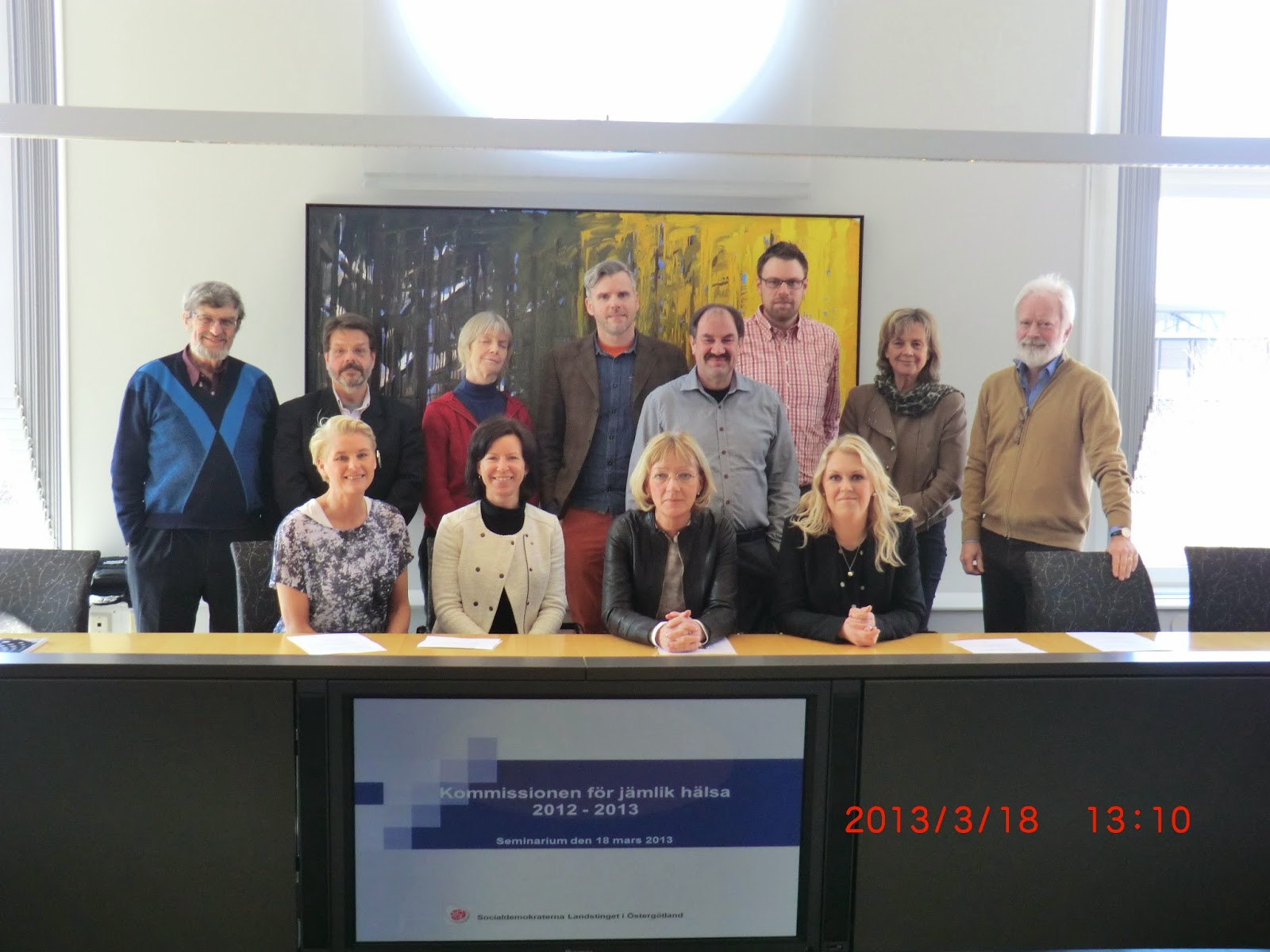 |
| The Commission for Health Equity in Östergötland 2012-2013 |
By this article I wish to combine my professional skills about public health with my political ambition: to achieve equity, gender equality and solidarity in society by enhancing human health and living conditions. My purpose is to present my vision of an egalitarian society.
The society of the future is built on Health
 |
| Report: The path to an egalitarian society |
For this reason and with support from the Commission's report, I wish to highlight the goals and concrete actions that I see as crucial in achieving an egalitarian society; a work that is essentially about structural factors as well as having a holistic perspective on human health.
Overall objective
I would like to formulate the overall objective of an egalitarian society in accordance with the Commission's first recommendation:
All, regardless of talent, interest, occupation or place of residence, should be given the opportunity to develop and live in social and economic settings where one can feel sense of community, pleasure of work, hope and faith in the future.
Three goals
The three goals that I consider as crucial in the work of an egalitarian society I would like to illustrate using a life cycle perspective as follows:
Children
|
Adults
|
Elderly
|
| Stable economy | Stable economy | Stable economy |
| Social security | Social security | Social security |
| Existential health | Existential health | Existential health |
For all age groups it is on policy to create the prerequisites for giving people stable economic conditions and basic social security by strengthening individuals and groups, and increase integration between people. It's also about contributing to existential health, which here means responding to life problems and working for hope and faith in the future.
Concrete actionsI would hereby like to give examples of actions that in my opinion are important for achieving these three goals. Based on the determinants of health (Whitehead & Dahlgren, 1991) efforts spans over all policy areas and contribute in different ways to enhance human health and living conditions. The foundation for a stable personal economy is to have a job, which requires an active labor market policy for full employment.
It also requires an economic redistribution policy, environment- and climate initiatives as well as educational activities for both children and adults. Furthermore, efforts to make workplaces health promoting and to pay attention to the unpaid work are crucial to achieve economic independence.
As significant as economic stability so is the social security. This is about the strengthening of social networks and activities for individuals and groups, to improve the social welfare system and to strengthen parental insurance. Social security is also accessible through more and better housing, improved public transporting as well as better social infrastructure in terms of more effective organizations and increased cooperation between authorities.
I have chosen to create the term existential health as a third and decisive goal to achieve an egalitarian society. The work with existential health is based on Aaron Antonovsky's concept KASAM, which means sense of coherence, feeling life being comprehensible, manageable and meaningful. Working to reach existential health is also about making norms and values visible and to counter the individualization of problems.
Continued debate
In conclusion, I would once again like to highlight the three goals of all individuals and groups in our society: stable economy, social security and existential health. This approach, I believe is crucial to enhance human health and living conditions and constitute the foundation of an egalitarian society. This means that we must always work for integrating health issues into policy decisions.
Finally, it is my hope that this article and partly new perspective will lead to further debate about what kind of society we want to live in and what political vision we want to have as the basis of future society. My vision is clear - an egalitarian society is possible!
Linköping, Sweden August 2014
Birgitta Larsson
Social Democratic Member of the County Council of Östergötland and the East Sweden Region, Sweden
Linköping, Sweden August 2014
Birgitta Larsson
Social Democratic Member of the County Council of Östergötland and the East Sweden Region, Sweden
..................................................................................................................................
Links:
Inga kommentarer:
Skicka en kommentar